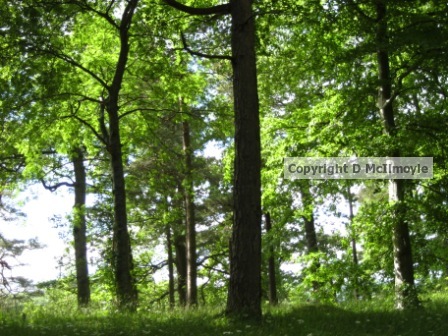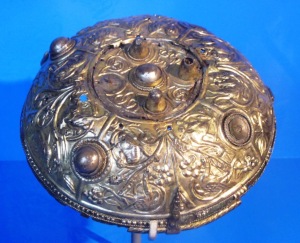If you live on this island at the moment, there’s no avoiding a certain debate about the land that lies at its northernmost end. It’s a particularly odd moment for Cumbria, as we share a border with Scotland and indeed for large chunks of its history, large chunks of Cumbria actually were in Scotland. I could wade through a list but perhaps this is best exemplified by Carlisle Castle; the ‘mighty keep’ (tower) was built by King David of Scotland and he died right here in 1153.
It’s made a lot of us think about how we define ourselves. Like many people around these parts I’m a real northwestern mongrel, with a mixture of Cumbrian, Irish and Scottish blood, names, appearance, and history. I’ve drawn the conclusion that I should side-step recent history – by recent I mean several hundred years’ worth – and decide that I’m British.
‘Britain’, of course, is as Tim Clarkson says in this excellent post, not a political entity but an historical one, describing an island off mainland Europe. That’s the whole island, north to south, east to west, and it includes a whole bag of ethnic micro-identifiers, ancient and modern.
I can even claim Camden, the 16th century historian, in evidence. In the wonderfully lyrical first English translation by Philemon Holland of 1610 – perhaps, appropriately, Camden’s 1586 original was not written in English or Welsh or Gaelic but Latin – Cumberland remembered it was peopled by Britons long after everyone else had adopted other labels.
‘Westward, Northward from Westmoreland lieth Cumberland, the utmost region this way of the Realme of England, as that which on the North side boundeth upon Scotland. On the Southside and the West the Irish sea beateth upon it, and Eastward above Westmorland it butteth upon Northumberland. It tooke the name of the inhabitants, who were the true and naturall Britans and called themselves in their owne language Kumbri and Kambri. For the Histories testifie that the Britans remained heere a long time, maugree [despite] the English Saxons, howsoever they fretted and stormed thereat: yea and Marianus himself recordeth as much, who tearmed this Country Cumbrorum terram, that is, The land of the Cumbri, or Britans, to say nothing of the places that everywhere here beare British names, as Caer-Luel, Caer-dronock, Pen-rith, Pen-rudocc, &c., which declare the same and as cleerely proove mine assertion.’ (William Camden’s Britannia, 1610 Philemon Holland translation, opening part of entry for Cumberland.)
(North-west of Westmorland is Cumberland, the furthest part of England, which borders Scotland. In the south-west it meets the Irish Sea, and to the north-east, Northumberland. It is named after its inhabitants, who were the original Britons, who called themselves cumbri. History says that the Britons were here long after the anglo-saxons arrived. Marianus [an 11thcentury writer] said this, calling it land of the Cumbrians, or Britons, and also there are British place-names everywhere, such as Carlisle, ***, Penrith and Penruddock, which proves my point.)
The word, ‘Cumbria’, as we all know (after three years of Esmeralda’s!), is from the same brythonic language root as the Welsh cymru and cymry, the Welsh words for Wales and Welsh. It’s usually translated as ‘fellow countrymen’ or, as I like to think of it, ‘people like us’. Everyone on this island spoke a dialect of that language when the Romans arrived, and it was gradually pushed back by successive language invasions from variants of anglo-saxons and to a lesser extent, gaelic speakers. Now the remnants of the language of the Britons are to be found in Wales and Brittany and a scattering of enthusiasts in Cornwall. Cumbria retains it in the oft-quoted sheep-counting dialect (‘yan, tan, tethera’), but we spoke it to some extent until the 10th century, well after the pesky anglians started putting their oar in.
I’d like to think that Camden was particularly keen to include these facts because despite being born and bred in London, he knew that, ‘Wirkington, a place famous for the taking of Salmons, and now the seat of the ancient family of the Curwens… heere have they a stately house built Castlelike, and from whom (without offence of vanity be it spoken) my selfe am descended on my mothers side’. I’m also descended from Workington on my mother’s side (albeit not via the Curwens) and it seems we feel the same, 400 years apart.
Whatever whoever wants to call whichever part of the island of Britain after The Vote, I know one thing. Cumberland will hold as true to its Camden/Holland description as it ever has.
‘…although it be somewhat the coldest, lying farre North, and seemeth as rough by reason of hilles, yet for the variety thereof it smileth on the beholders, and give contentment to as many as travaile it. For after the rockes bunching out, the mountaines standing thicke togither, rich of mettal mines, and betweene them great meeres stored with all kinds of wilde-foule, you come to prety hills good for pasturage and well plenished with flocks of sheepe, beneath which againe you meet with goodly plaines spreading out a good way, yeelding corne sufficiently. Besides all this, the Ocean, driving and dashing upon the shore…
Roll on Cumbria, land of the Britons.
©Diane McIlmoyle
Notes
1. This is not part of the political argument, and I have no view on whether Scotland’s political future should lie within or outwith the UK. People bringing politics to Esmeralda’s will be subject to the usual punishment of defenestration.
2. The Camden quotes are all from the first English version, translated by Philemon Holland in 1610. Isn’t his language marvellous? The spelling and punctuation, with all its idiosyncracies and inconsistencies, is Holland’s original.
3. If you’re seeing a really weird page layout, that’s WordPress’s idiosyncracies. Grrrrrr.










